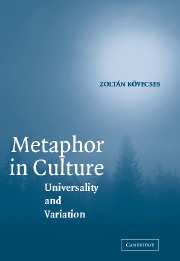Book contents
- Frontmatter
- Contents
- Preface and Acknowledgments
- Metaphor in Culture
- 1 Introduction: Metaphor and the Issue of Universality
- PART I UNIVERSAL METAPHORS
- 2 Metaphor: From Language to Body, and Back
- 3 Universality in Metaphorical Conceptualization
- PART II DIMENSIONS OF METAPHOR VARIATION
- PART III ASPECTS OF METAPHOR INVOLVED IN VARIATION
- PART IV CAUSES OF METAPHOR VARIATION
- References
- Index
3 - Universality in Metaphorical Conceptualization
Published online by Cambridge University Press: 05 June 2012
- Frontmatter
- Contents
- Preface and Acknowledgments
- Metaphor in Culture
- 1 Introduction: Metaphor and the Issue of Universality
- PART I UNIVERSAL METAPHORS
- 2 Metaphor: From Language to Body, and Back
- 3 Universality in Metaphorical Conceptualization
- PART II DIMENSIONS OF METAPHOR VARIATION
- PART III ASPECTS OF METAPHOR INVOLVED IN VARIATION
- PART IV CAUSES OF METAPHOR VARIATION
- References
- Index
Summary
Given what we have seen in the previous chapter, it should come as no surprise that at least some conceptual metaphors can be and are found in many languages. If some kinds of conceptual metaphors are based on embodied experience that is universal, these metaphors should occur – at least potentially – in many languages and cultures around the world. In this chapter, I investigate whether this is indeed the case. I present case studies that involve potentially universal metaphors on which work has been done in several unrelated languages. Although the number of these languages is relatively small in the case studies to be discussed, they are sufficiently diverse to suggest at least the possibility of universal – or near-universal – status. I want to emphasize that the claim is not that these metaphors embodied in universal experience must be found in all languages; the claim is that, given the universal experiences on which they are based, the metaphors can potentially be universal, but we should not expect them to show up in all languages.
THE CASE OF EMOTIONS
Emotions are commonly said to be private and heavily culturally dependent experiences that are inaccessible to others. For this reason, the language and underlying conceptualization of emotional experience are expected to be highly culture-specific. I later present data that suggest that this claim or expectation should be taken with a grain of salt. This section repeats materials from my earlier work (Kövecses, 2000, 2002).
HAPPINESS
It seems that several unrelated languages share several conceptual metaphors for particular emotion concepts. One of these concepts is happiness.
- Type
- Chapter
- Information
- Metaphor in CultureUniversality and Variation, pp. 35 - 64Publisher: Cambridge University PressPrint publication year: 2005



